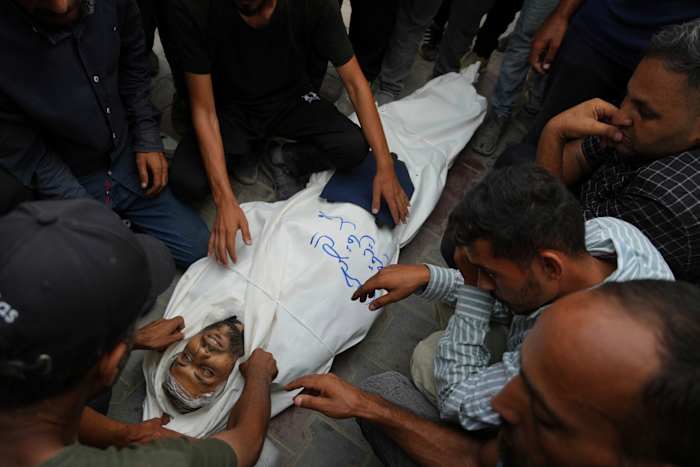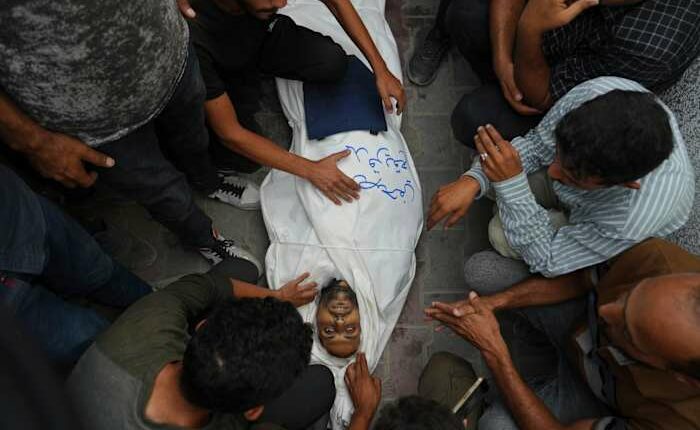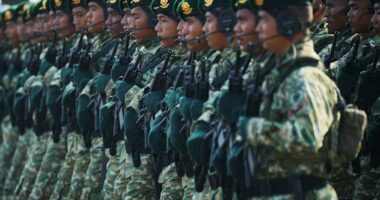Share this @internewscast.com

JERUSALEM – On Sunday, an airstrike by Israel’s military claimed the life of an Al Jazeera correspondent, along with another journalist from the network and at least six others who were seeking refuge outside the Gaza City Hospital complex.
Shifa Hospital authorities reported that the deceased included Al Jazeera reporters Anas al-Sharif and Mohamed Qureiqa. The attack also took the lives of four additional journalists and two more individuals, according to Rami Mohanna, the hospital’s administrative director, speaking to The Associated Press. The airstrike further caused damage to the emergency department’s entrance at the hospital complex.
Both Israeli and Gaza City hospital officials confirmed these fatalities, with media rights advocates labeling them as actions against those chronicling the conflict in Gaza. On the same day, Israel’s military labeled al-Sharif as a Hamas leader — a claim that both Al Jazeera and al-Sharif had previously dismissed as unfounded.
This event was the first instance in the conflict where Israel’s military quickly took responsibility after a journalist had been killed in an airstrike.
Less than a year earlier, the Israeli army had initially accused al-Sharif and other Al Jazeera journalists of affiliation with militant groups like Hamas and Islamic Jihad. In a video dated July 24, army spokesperson Avichay Adraee criticized Al Jazeera and accused al-Sharif of being connected to Hamas’ military operations.
Al Jazeera condemned the attack as a “targeted assassination” and accused Israeli leaders of incitement, relating al-Sharif’s death to long-disputed allegations denied by both the network and the correspondent.
“Anas and his colleagues were among the last remaining voices from within Gaza, providing the world with unfiltered, on-the-ground coverage of the devastating realities endured by its people,” the Qatari network said in a statement.
International media have been mostly barred from entering Gaza throughout the war and Al Jazeera is among the few outlets still fielding a big team of reporters inside Gaza, chronicling daily life amid airstrikes, hunger and the rubble of destroyed neighborhoods.
The network has suffered heavy losses during the war, including 27-year-old correspondent Ismail al-Ghoul and cameraman Rami al-Rifi, killed last summer, and freelancer Hossam Shabat, killed in an Israeli airstrike in March.
Like al-Sharif, Shabat was among the six that Israel accused of being members of militant groups last October.
Hundreds of people, including many journalists, gathered Monday to mourn al-Sharif, Qureiqa and their colleagues. The bodies lay wrapped in white sheets at Gaza City’s Shifa Hospital complex. Ahed Ferwana of the Palestinian Journalists Syndicate said reporters were being deliberately targeted and urged the international community to act.
Al-Sharif reported a nearby bombardment minutes before his death. In a social media post that Al Jazeera said was written to be posted in case of his death, he bemoaned the devastation and destruction that war had wrought and bid farewell to his wife, son and daughter.
“I never hesitated for a single day to convey the truth as it is, without distortion or falsification,” the 28-year-old wrote.
The journalists are the latest to be killed in what observers have called the deadliest conflict for journalists in modern times. The Committee to Protect Journalists said on Sunday that at least 186 have been killed in Gaza and Brown University’s Watson Institute in April said the war was “quite simply, the worst ever conflict for reporters.”
Al-Sharif began reporting for Al Jazeera a few days after war broke out. He was known for reporting on Israel’s bombardment in northern Gaza, and later for the starvation gripping much of the territory’s population. Qureiqa, a 33-year-old Gaza City native, is survived by two children.
Both journalists were separated from their families for months earlier in the war. When they managed to reunite during the ceasefire earlier this year, their children appeared unable to recognize them, according to video footage they posted at the time.
In a July broadcast al-Sharif cried on air as woman behind him collapsed from hunger.
“I am taking about slow death of those people,” he said at the time.
Al Jazeera is blocked in Israel and soldiers raided its offices in the occupied West Bank last year, ordering them closed.
Al-Sharif’s death comes weeks after a U.N. expert and the New York-based Committee to Protect Journalists said Israel had targeted him with a smear campaign.
Irene Khan, the U.N. Special Rapporteur on freedom of expression, on July 31 said that the killings were “part of a deliberate strategy of Israel to suppress the truth, obstruct the documentation of international crimes and bury any possibility of future accountability.”
The Committee to Protect Journalists said on Sunday that it was appalled by the strike.
“Israel’s pattern of labeling journalists as militants without providing credible evidence raises serious questions about its intent and respect for press freedom,” Sara Qudah, the group’s regional director, said in a statement.
___
Magdy reported from Cairo.
Copyright 2025 The Associated Press. All rights reserved. This material may not be published, broadcast, rewritten or redistributed without permission.











